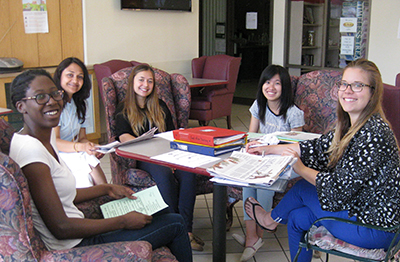Volunteers in the Aphasia and Communication Disabilities program have
varied interests, ages, personal styles, occupations and
ethnic background.
Why Volunteer?
Some
reasons for volunteering include:
- To
help others
-
Give back to the community
- Develop
new skills
- Reach
educational goals
- Gain
professional experience
Volunteers participate
weekly in discussion groups and
skill sessions with adults with aphasia and related communication disabilities.
Our volunteers
work in collaboration with
Speech-Language Pathologists and
Communicative Disorders Assistants.
Volunteers
provide our clients with the opportunity to have
meaningful adult conversations. In other words, volunteers provide
“communicative access” for our clients.
Testimonials
“What
I appreciate about the Aphasia and Communication Disabilities Program is the
recognition of the vital roles volunteers play in the agency,
they are partners trained to
help our
clients improve communication. As long as this continues, these programs will succeed.”
- Diana Bullock, ACDP Volunteer
"This clinical exposure has vastly
expanded my knowledge and
appreciation of the
speech therapy profession, and
reinforced my commitment to pursue a
career in speech language pathology."
- Serg Fazylau, ACDP Volunteer
"Volunteering at ACDP solidified my
desire to enroll in the CDA program and, I believe, was a strongly
contributing factor in my
acceptance to the program."
- Kim Cummings, ACDP Volunteer
"Volunteers for this program are
treated with the utmost
respect. Each volunteer is given a chance to
lead group sessions, if they choose, and are encouraged to
use their
talents and
skills to enhance the
discussions and activities for the clients."
- Colleen Brown, ACDP Volunteer
“My
volunteer experience was one worth taking; it
taught me about myself and what I needed to do to make those around me more comfortable. Most importantly it
showed me that
happiness is truly
what you make of it, and the
clients at (ACDP) prove that. There is always a shoulder to lean on, an ear to listen, a voice to give advice, and someone who understands. I am
truly blessed to have had
such an experience.”
- ACDP Volunteer
"Regardless of your reason for volunteering,
ACDP works towards
bettering the lives of people on a daily basis - not just the lives of
clients, but
also the lives of
volunteers like you!”
- Saniya Dang, ACDP Volunteer
 Volunteers are an integral part of
Volunteers are an integral part of
making things happen at our programs!
How to Apply
-
Call or
email us to
set-up a
telephone interview
-
Visit one of our programs for a day to determine if the volunteer position is right for you
-
Complete the
volunteer application package
- Attend a
volunteer orientation and
training session
Some Typical Volunteer Roles Might Include:
Communication Facilitators:
Volunteers are trained by
SLPs and
CDAs to use a variety of
supportive communication strategies, so clients have “equal opportunity” to participate in discussion groups.
Volunteers use their unique
talents and
hobbies to
develop skill sessions for clients, in an
“aphasia friendly”, adult learning format.
Life History Communication Book Developers:
Volunteers use
supportive communication strategies to
develop personalized communication books in collaboration with clients and their families. This
enables clients to share their life experience through
photographs and
stories in an “aphasia-friendly” format
Technology Volunteers:
Volunteers help clients learn the basics as well as how to
use technology (computers, tablets, cell phones and apps) to communicate more effectively.
Cognitive Communication Disorders (CCD) Group Volunteers:
Volunteers are trained to
facilitate social conversation and
problem solving activities, encouraging clients to
share their
weekly triumphs and challenges as well as developing skills in
mindfulness and
reflection.
SLP/CDA Administrative Volunteers:
Volunteers help
SLP and CDA staff with
administrative tasks and
file maintenance related to the program, and
learn about the ISO (International Standards Organization) and
CASLPO (College of Audiologists and Speech-Language Pathologists of Ontario)
standards.
Office Volunteers:
Volunteers help with
administrative tasks in our
main office.
Social Work Volunteers:
Volunteers assist the
ACDP Social Worker with providing support to caregivers and families of ACDP clients.
Special Events Volunteers:
Volunteers assist clients and staff with
awareness and fundraising events,
displays at conferences and
fairs in the community,
Aphasia Camps and
Retreats, Living with Stroke and Aphasia
sessions, and
workshops.
Current Volunteer Positions
While we are fortunate to have the support of many dedicated volunteers,
we are always looking to add to our team.
